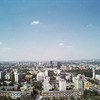Communist Cats Among The Pigeons
When communist rulers cracked down on Poland's Solidarity movement in 1981, Malgorzata Niezabitowska risked prison to smuggle out photographs of tanks on Warsaw's streets and police turning water cannons on protesters.
Today, Niezabitowska, the spokeswoman for Poland's first post-communist government in 1989-90, faces allegations that she collaborated with the secret police of the very regime she struggled against.
The case is the most sensational to arise from Poland's recent opening of communist-era files to victims, journalists and historians.
Such files have haunted former Eastern bloc countries since the end of the Cold War. Hungary, like Poland, is only now moving to allow limited public view of its secret police dossiers though both countries have screened candidates for public office for years. In Romania, files of the dreaded Securitate secret police remain largely closed.
In Germany numerous public figures have been discredited by the files of East Germany's secret police, the Stasi, which were opened to victims, historians and journalists after reunification in 1990.
Niezabitowska acknowledges speaking to the secret service once when she was detained on Dec. 15, 1981, days after the communist authorities under Gen. Wojciech Jaruzelski imposed martial law to try to snuff out the Solidarity trade union movement.
But she denies being an informer.
"I was not a collaborator -- not for one second," Niezabitowska told The Associated Press in an interview at her home in a Warsaw suburb. "I did not have a moment of weakness. The only thing I did during the interrogation was to talk about what was a legal newspaper. I didn't give them anything they didn't know."
She also says she had no other meetings with secret police as alleged in her file, now in the possession of the state-run National Remembrance Institute. Many critics question whether it is possible to trust documents prepared by officials under pressure to produce results to their superiors.
Niezabitowska accuses the institute's historians of "thinking that the security service's files are the Old and New Testament together -- God's word not to be doubted."
"What is there in these files, is that I am a traitor to my country," said Niezabitowska. "But for me, it would be better to be accused of killing someone."
People running for public office must declare whether they collaborated or not. A public ombudsman may investigate questionable declarations, and politicians found to have lied can be banned from office for 10 years. Admitting collaboration, however, carries no penalty.
So ironically, the broader opening of the files has ensnared mostly former Solidarity activists such as Niezabitowska -- not former regime supporters, some of whom have admitted their past and remained eligible for office.
Niezabitowska said that during the seven-hour interrogation in 1981 she might have expressed a negative opinion about journalist Krzysztof Wyszkowski, managing editor of the Solidarity Weekly newspaper where she had worked as a reporter.
She said she thought him unqualified.
But she can't say for certain what's in the file. Polish law bans suspected informers from viewing the files; and she can no longer remember details of her statements from 23 years ago.
In hopes of clearing her name, she is seeking a trial under provisions of Polish law that let her seek a court decision on whether she was an informer.
The former colleague, Wyszkowski, said he "can't answer whether she hurt me in any way because documents talking about the campaign against me were destroyed."
During martial law, Niezabitowska's husband, photographer Tomasz Tomaszewski, used miniature cameras hidden in his clothing, while she would slip the negatives to a Western diplomat. Had she been caught, she could have faced a long prison term or even the death penalty for what authorities considered espionage.
The publication of the pictures in newspapers abroad exposed the authorities' heavy-handed tactics.
While hers is by far the most prominent case, others have included former members of the Student Solidarity Committee, who found that two of their members had been secret police informers. One of them was Leslaw Maleszka, a commentator for the Gazeta Wyborcza newspaper referred to in the files under the code name "Ketman."
In another case, Henryk Karkosza, former publisher of underground publications, has asked the special court that screens politicians to look into accusations against him, hoping to clear his name. A hearing is set for Feb. 10.
Pawel Machcewicz, a historian at the remembrance institute, defends the accuracy of the files on Niezabitowska. "I don't see any indication that it was faked or forged," Machcewicz said.
"In my opinion, assuming that this file is not faked -- I think this is a dramatic story of a young person who was put under very strong pressure and who agreed to cooperate but tried not to hurt anyone."
The archives have provoked a heated debate in the Polish media after journalist Bronislaw Wildstein secretly copied a list of some 240,000 names that jumbles up former secret agents and informers with the victims of persecution. He was fired from the respected Rzeczpospolita daily, which said he was getting involved in politics.
Two right-wing parties, the League of Polish Families and Self-Defense, have called for making all files public and for posting names of informers on the Internet.
Sociologist Edmund Wnuk-Lipinski at the Polish Academy of Sciences said Poland should move from its partial opening of the files to a systematic attempt to bring former oppressors to justice and also clear people now being damaged by unchecked gossip.
"It will certainly be dramatic on a personal level," he said. "Some people will face dramatic knowledge about their friends, their relatives sometimes," he said. "But on a macro scale, I think there will be a healing process."


 Coctail Bar Max & Dom Whisky
Coctail Bar Max & Dom Whisky
 Setka
Setka
 level 27
level 27





